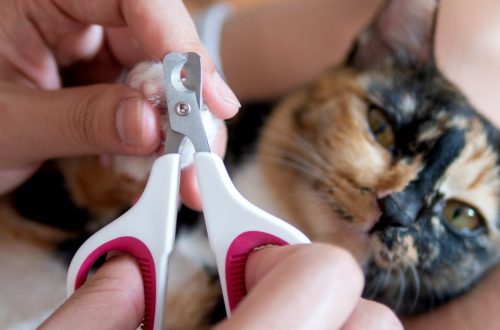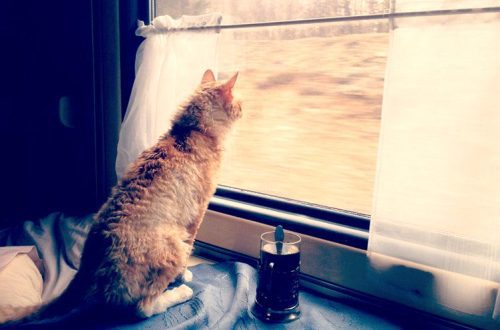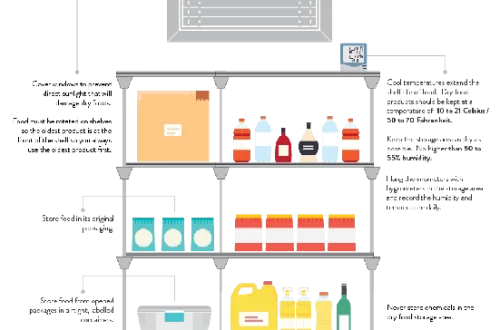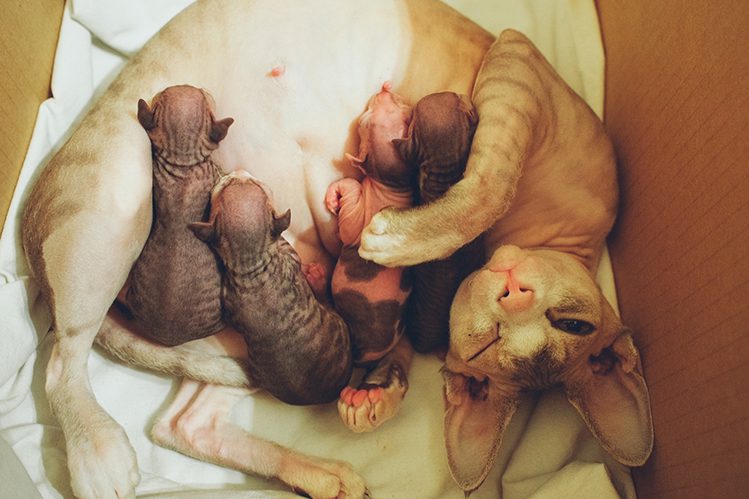
How to care for a newborn kitten?
Kittens from the first day of life grow and adapt to the environment. We will analyze the features of caring for a kitten in the first week of life. We will tell you how to help a mother cat at the initial stage of raising offspring. Separately, we will dwell on how to care for a newborn kitten without a cat.
Kittens are born covered in fur. It is still too thin to keep babies from losing heat. Therefore, the crumbs gather in a pile, cuddle up to the mother – they are so warmer.
The body weight of a newborn kitten varies from 80 to 120 grams. The body length is approximately 9 to 12 centimeters.
The eyes of newborn pets are tightly closed, they open slightly at the end of the first week. In no case should you open the kitten’s eyes with your fingers, the baby must gradually adapt to the environment. Immediately after the birth of the kittens, the umbilical cords need to be treated with a disinfectant solution, this will protect the babies from infections. The umbilical cord will fall off by itself on the third or fourth day of life.
The baby’s ears will also open gradually. A newborn kitten’s ears are clogged with folds of skin. In the first week, the baby primarily relies on smell and touch. Already on the second day of life, the kitten moves closer to the mother’s abdomen, distinguishing the smell. Reflexes help the baby to grab the nipple and suck out mother’s milk. These reflexes will greatly help the owner if they have to bottle-feed the baby without a mother cat.
In the first week of life, small pets do not walk, but crawl around the family nest – they sort it out with their front paws. On the fourth or fifth day, the kitten acquires hearing, begins to react to loud sounds.

For a cat with kittens, you need to equip a place where the whole family will be warm and safe. This can be a basket or a cardboard box deep enough for the kittens not to crawl out of it. Lay the fabric in several layers on the edges of the box. At the bottom is a woolen blanket. Lay disposable diapers on the blanket – they will need to be changed as needed.
Buy an aquarium thermometer from the pet store and put it in the cat’s hiding place. So that the babies do not freeze under their thin fur, it is necessary to maintain a temperature of about 30 degrees Celsius in their house in the first weeks of life. A heating pad wrapped in a soft towel can help with this. Or an electric heater turned on at minimum power. Put the heater on only one side so that part of the shelter is cooler. Make sure that the pet’s home is not in a draft or near a radiator.
Kittens from the first day of life are under the vigilant supervision of a cat-mother. If she feeds the kittens herself, then your role will be limited to supporting the family idyll. Equip a cat tray next to the house. Keep food and drink nearby for her. So mom can practically not go away. Keep an eye on the well-being of the mother cat, she should eat properly and give newborns enough milk.
A cat knows best how to take care of its children, so you better watch them from the side. Try not to take kittens in your hands, otherwise there is a risk that the cat will no longer recognize its babies.
For the first couple of days, the mother cat gives the kittens colostrum, which is different from normal cat milk. Colostrum contains antibodies and provides newborns with immunity. In a few days, a mother cat gives her children the natural protection of the body against infections, which will act for the first months of his life.
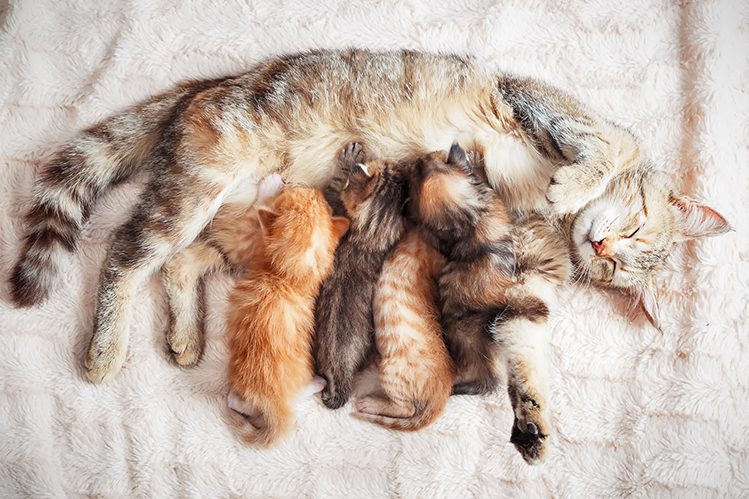
Sometimes there are situations when kittens are left without a mother or she cannot give them milk. How to care for a newborn kitten without a cat, how to feed and clean it?
If you adopted a kitten from a stray cat’s litter, take it to the veterinarian first. You need to make sure that the pet is not contagious. This is especially important if there are other pets in the house. The kitten may be in the incubation period, so it is better to keep it in a separate room for a couple of days. If you are nursing a whole litter of kittens, you can make one house for all of them, the main thing is that they should not be crowded.
Constantly look after the kittens, they are very defenseless. If you can’t always be at home, involve loved ones in caring for babies.
In the first week of life, kittens mostly sleep and eat. They can sleep 22 hours a day.
The ideal option is to find a “foster mother” for a kitten or kittens who can feed them. Unfortunately, this is not always possible, and the owner will have to act as a mother. Babies should be fed small meals every two hours. What to feed? A special cat’s milk substitute, which can be bought at a veterinary pharmacy or pet store. Cow’s milk is not suitable for feeding kittens.
At one meal, a newborn kitten absorbs approximately five milliliters of cat’s milk replacer. You can measure with a bottle from a special kit for feeding kittens or with a plastic syringe without a needle. A pacifier can be made by piercing part of a pipette. Food for a kitten should be heated to a temperature of 35-38 degrees, it is advisable not to use a microwave. Warm milk in a closed bottle under hot running water. So that the kitten understands that he needs to suck on the bottle, lubricate the nipple with its contents.
Remember what position the kitten’s body is in when it absorbs mother’s milk. The baby sits, slightly raising his head, rests his paws on the belly of the mother cat. Try to feed the kitten in the same position. As the kitten is satiated, it begins to suck more and more sluggishly and falls asleep.
After eating, the dishes should be boiled every time.
After each feeding, gently massage the tummy and excretory organs of the kitten with a sterile swab dipped in warm water. So you will help him go to the toilet, because in the first week of life he cannot cope with this task on his own. Urination, as a rule, occurs after each feeding, defecation – about three times a day. Once a day, wipe the kitten’s body with a warm, damp towel – alas, there is no mother cat nearby who could lick the baby’s fur.
In the first week, the kitten grows rapidly. Every day, his body weight increases by about 10 grams. The task of the first week of a kitten’s life is to get stronger.
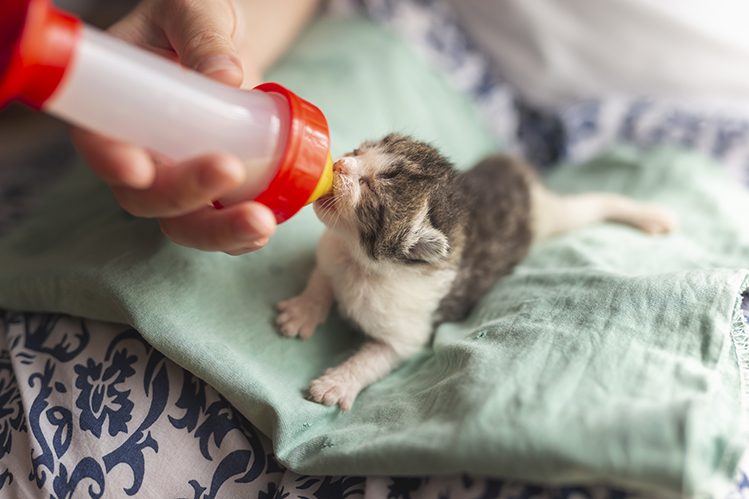
A healthy kitten at the age of one week should respond to loud sounds, easily crawl up to half a meter to the mother’s abdomen. The coat begins to fluff, the first undercoat appears. The kitten no longer sleeps all day long, its eyes slightly open.
Body weight for a week increased significantly, paws got stronger. If the kitten tries to stand up, be sure to hold it from below with your palm, it still cannot stand firmly on four legs.
While the kittens are very young, call a veterinarian at home. The sooner you show your baby to a specialist, the better. For any disturbances in the well-being of the kitten, consult a doctor. Procrastination and attempts to treat a small pet yourself will put him at great risk.
The first vaccinations for a kitten are usually done at the age of 12 weeks. Ask your veterinarian about them in advance. We hope that a happy start to the life of a kitten will be the key to many years and good health for your pet.



